Fusion Body Art | Sampler Face Painting Palette
10+ In Stock!
Face Painting is a fun activity that can be enjoyed year-round, but it is important to do it safely so that everyone can enjoy.
As professional face painters with years of experience in our industry, we have a list of the top 10 safety and hygiene tips that you should consider when face painting kit or when you are the one getting painted.
The most important thing is to start with the right products. Only use cosmetic grade products that comply with your country's regulations. In the USA, we recommend to use only FDA compliant face paints. All of the face paints you can find at our store are FDA compliant with the exceptions of some UV/Neon paints (which are still considered safe, but not FDA compliant).
You can read more about FDA regulations on cosmetic products in the USA on the FDA website.
Are Acrylics Safe to Use for Face Painting?
No, acrylic craft paints are not safe for face and body painting and should be avoided. Acrylic paints have a lot of pigments that are not meant to be used on the skin and can cause serious irritations. If you Google "allergic reactions to acrylic paints" you can find a lot of images that show what can happen to your skin when you use acrylics. We can't post those images here because we don't own the copy rights to them.
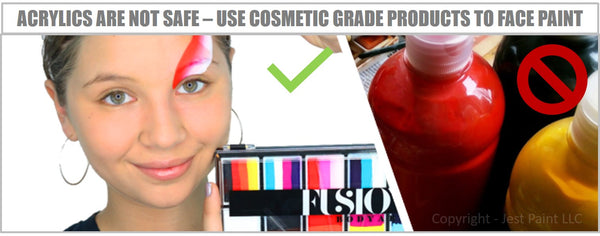
We understand acrylics can be cheaper and easier to find at any craft stores, but cheaper and readily available doesn't make them safe. If you want to avoid giving someone an allergic reaction that could end badly, then stick to cosmetic grade products.
Are Non Toxic Paints Safe to Use for Face Painting?
Remember, a NON-TOXIC label does not make it safe for skin. It just means you won't die from poisoning if it comes in contact with the skin, but it doesn't mean it is safe to use it or that it was meant to be used on the skin.
If you call and ask any major acrylic craft paint brand if you can face paint with their product they will give you a very specific answer: no, our products are not designed for face and body painting.
If you are looking for a specific brand of face paint that is very high quality, affordable and safe, please check Fusion Body Art.
10+ In Stock!
Fusion Body Art | Sampler Face Painting Palette
Can I Still Get an Allergic Reaction to Face Paints?
Yes, any cosmetic product can cause an allergic reaction. Even the best products can, but when you use cosmetic grade products you are reducing the chances for an allergic reaction. Always look at the ingredients lists, and if you are concerned about specific ingredients, then ask. If you are the one getting painted or your child is, then make sure you ask the painter if their face paints are cosmetic grade and if they have any of the allergens you or your child are allergic to. If you are the painter, then make sure to ask the person or their guardian if they are allergic to anything. When in doubt, it is best to do a patch test on the inside part of your elbow, paint a little bit, let it sit for 30 minutes and wash it off. If the skin looks fine then chances are you won't have an allergic reaction. If you have life threatening allergic reactions it might be best to consult with a doctor first.
You can have the best products in the world but if you don't keep your application tools (face painting brushes and sponges) clean, then it won't matter.
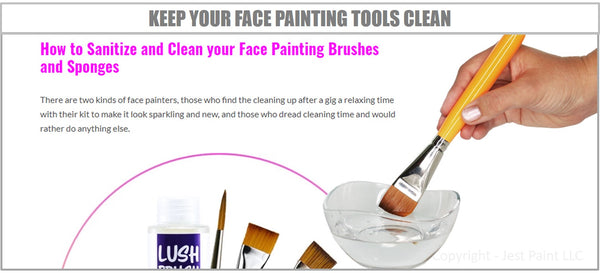
We strongly suggest you only use one sponge per person, and if possible, only load the makeup once, so you do not have any chances of taking any bacteria from the face into your makeup. Although good face paints have several anti bacterial properties to reduce the chances of contamination, it is best to avoid double loading when possible.
Do I Need to Use Disposable Tools?
No, you don't unless you are working at a hospital or with patients that have a compromised immune system. If you are working with healthy individuals, you can simply just use clean tools that have been properly sanitized.
How do I Keep my Sponges and Brushes Clean?
That is a very important question and we suggest that you visit our How to Sanitize and Clean your Face Painting Brushes and Sponges blog post for a more in depth explanation. The short answer is: only use one sponge per child, and wash them thoroughly after each event using a disinfectant soap and drying them with a dryer before storing them. When using brushes, try to only load your brush once, and then, you can rinse your brush with water, soak it in 70% alcohol and let it fully dry before the next use.
Although that is the ultimate hygiene rule, most painters will use the one sponge per person rule but still load their sponge multiple times if necessary. And when using brushes they will use the same brush with every person, but they usually rinse it very well in between each person. You can add soaps with sanitizing properties like the Jest Paint's Brush and Body Wash soap to your water to help keep your brushes cleaner.
A very important thing to keep in mind when face painting is that your water should be clean safe to drink water, or distilled water. Never use water that is not safe for human consumption because it can contaminate your paints and be potentially dangerous for the one getting painted. Always make sure you are using fresh water and that any old dirty water is properly disposed of.
If you want to always have fresh water to rinse your brushes on, we strongly recommend you use the Rinse Well.
Keeping your hands clean is not only important to keep you and those you are painting healthy, but it also helps provide a more professional image than if your hands are covered in paint. Keep some baby wipes at hand so you can clear your hands when they get dirty or in between customers and that way you can avoid cross contamination.

Your face painting kit, or the kit of the person that will paint you or your child should be clean at all times. A good painter will keep a nice and clean looking kit and will stop in between customers to clean up so that no dirt, germs or dirty tissues can contaminate their kit.
How Should Face Paints be Stored?
Face paint cakes should be stored in a dry and cool place away from a direct source of light. This means, don't store your face paints in a damp basement, a hot or frigid car, or anywhere that might lead to a face paint meltdown or stone cold cake. Even while you are working, make sure to keep you paints out of direct sunlight or humid locations. Face painters should let their makeup air dry by leaving the lids off between uses until dry, or store the makeup in a case that allows you to transport your cakes without having to lid them. Do not store your makeup in a refrigerator since it can get contaminated with food allergens and odors. When cleaning the surface of your paints, avoid using any fuzzy cloths or chemical products; a clean damp face painting kit sponge is all you need to wipe the surface clean. Applying other chemicals like makeup sanitizers, baby wipes that contain perfumes, etc. can alter the chemical composition of your paints and stuff like towel and wet-wipe fuzz might get embedded in your paints. We do not recommend speed drying your paints by putting them into a microwave, which could destroy them. Instead consider using a food dehydrator, or setting your cakes near a space heater or over a bed of rice (without the makeup touching the rice), so that the extra moisture can evaporate or be absorbed.
It is never safe to get face and body paints over skin that is not in perfectly good conditions. If the skin already has a rash, or a wound, it is best not to paint there as that could infect the area and make it worse.
In this case, if possible, it is best to paint over a different area, far away from the one that has an issue so that when the person rinses the makeup off there are no chances for contamination.
Keeping the paint away from those areas is not only safer for the one getting painted, but it also prevents the painter from picking up bacteria from the area and passing them along to the next person in line.
If the person getting painted has a dirty face or the area you are going to paint over is dirty, then offer a baby wipe so they can clean themselves. That will help you avoid getting your tools contaminated, which can cause your paints or the next person in line to get contaminated.
This a very important issue as it is very common for people to use craft glitter at music festivals and other large events. Craft glitter is cheap but it can be very dangerous when applied near the eyes. Why you ask? Because it is made from metal, which is sharp, and it is not usually cut in a way that prevents sharp corners.
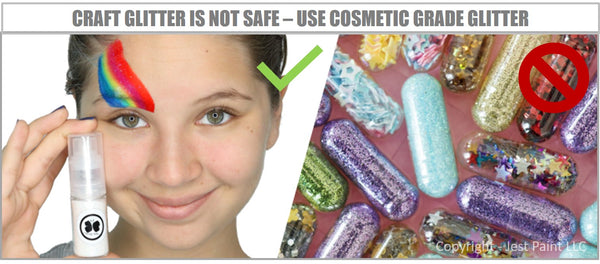
Cosmetic grade glitter is made from polyester or natural resins, and it is cut in specific shapes and sizes to make it safe to be used around the face.
Also, cosmetic grade glitters use only safe pigments.
If you are getting painted at an event you want to make sure that the face painter doing it is insure. The same way, if you are the painter, you want to be insured.
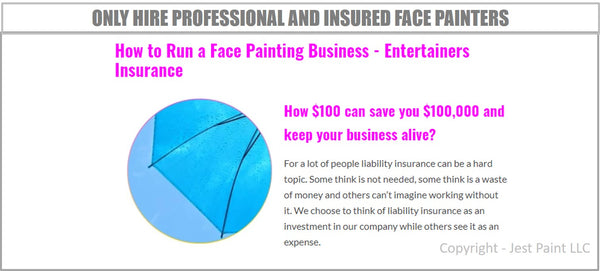
Insurance not only provides piece of mind in case of an allergic reaction, because insurance can cover the costs of dealing with that, but also indicates that the person doing the painting is a professional, that wants to protect themselves and his or her customers. If you haven't yet, we suggest you check our blog about face painting insurance.
When painting at an event, it is important to take care of your own health as well. Never paint if you are sick, as you will get even more exhausted and you can pass on your virus/bacteria on to others. Drink plenty of water, keep yourself away from the sun and take a few breaks here and there to stretch, go to the bathroom, eat a snack or even just to change positions. Use comfortable shoes and be aware of your posture. If you are uncomfortable change your set up so that you can be painting in a way that does not cause issues to your back, neck, legs and arms.
Only paint someone that is willing to get painted. If a parent brings a child that clearly does not want to get painted, then feel free to say no, as this should be a fun activity for kids and should not be forced upon them. You can suggest a balloon if you do those, or a gem, if the child agrees, but never paint on someone that has to be held against their will to be painted.
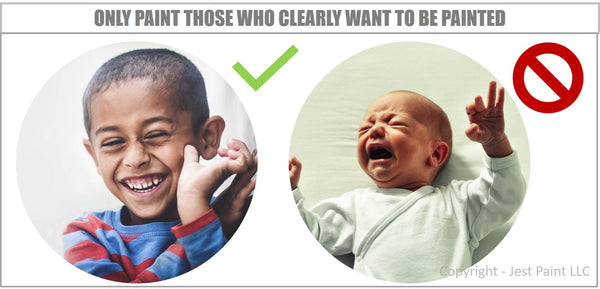
Hopefully this blog post has been of help and you are now a more informed painter or a more informed customer. By using these safety tips you can be sure to enjoy face and body painting without being worried about any health risks.
Feel free to share this blog post around with parents, adults, and beginner face painters that might need some extra tips, or those who are looking into hiring you and might be hesitant to pay for a professional face painter. Knowing the benefits of working with professional face painters that take into consideration all of the topics we shared here is a good way to remind someone why you are worth it.
If you enjoyed this blog post, make sure to read our other related blog posts, leave a comment below, share it with a friend, and don't forget to subscribe using the SUBSCRIPTION BOX right below :)
Disclaimer: we are not lawyers, doctors or insurance professionals and our opinion is based on our personal experience. We recommend for you to always check with a professional before making any decision. We are not in any ways giving legal or medical advice and we are not liable for any decisions you make or stop making based on the opinions provided above.
Comments
Leave a comment